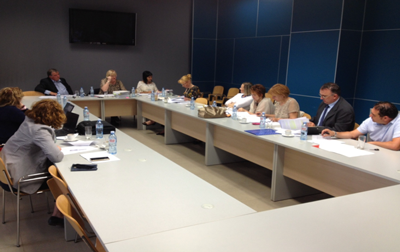 On July 19, 2016 the Working Group on Implementation of the Unified Backlog Reduction Plan (hereinafter: BLR WG), led by the President of the Supreme Court of Cassation, Chief Justice Dragomir Milojevic, met to discuss and adopt the Draft of the Amended Unified Backlog Reduction Plan.
On July 19, 2016 the Working Group on Implementation of the Unified Backlog Reduction Plan (hereinafter: BLR WG), led by the President of the Supreme Court of Cassation, Chief Justice Dragomir Milojevic, met to discuss and adopt the Draft of the Amended Unified Backlog Reduction Plan.
During the weekend preceded to this meeting, a designated number of WG members, supported by the MDTF-JSS Monitoring and Evaluation Specialist, retreated to finalize the draft amendments to the Unified BLR Plan, in accordance with April recommendations and conclusions (see: http://www.vk.sud.rs/sites/default/files/attachments/Zakljuci%20od%2004-04-16.pdf).
This draft was presented to the entire Working Group on the meeting of July 19 by Justice Snezana Andrejevic, Deputy President of the Supreme Court of Cassation. The Amended Unified BLR Plan introduces novelties related to the analysis of the statistical data on the work of courts: the backlog and overall caseload trends were analyzed chronologically from 2012 onwards in major categories – inflow, total pending, resolved, pending at the end of the year. These categories were observed from the courts’ perspective (averages per court of certain type and instance) and judges’ perspective (averages per judge in a court of certain type and instance).
In addition, caseloads and trends were analyzed by certain case types: civil (with and without enforcement cases), criminal, commercial, misdemeanor, administrative, from 2012 onward.
The Working Group took 2012 as the baseline, since it concluded that it took two years for the whole judicial system to stabilize from the reforms introduced in 2010.
The WG also amended its approach towards the measures to be taken to reduce and prevent backlog: apart from systemic measures (to be taken by all stakeholders in the sector: High Judicial Council, Ministry of Justice and Supreme Court of Cassation) and general measures (to be undertaken by all courts), the amended Unified BLR Plan identifies measures related to certain types of cases and types of proceedings, but also measures related to strengthening public trust and confidence, fostering cooperation with institutions outside the sector, etc.